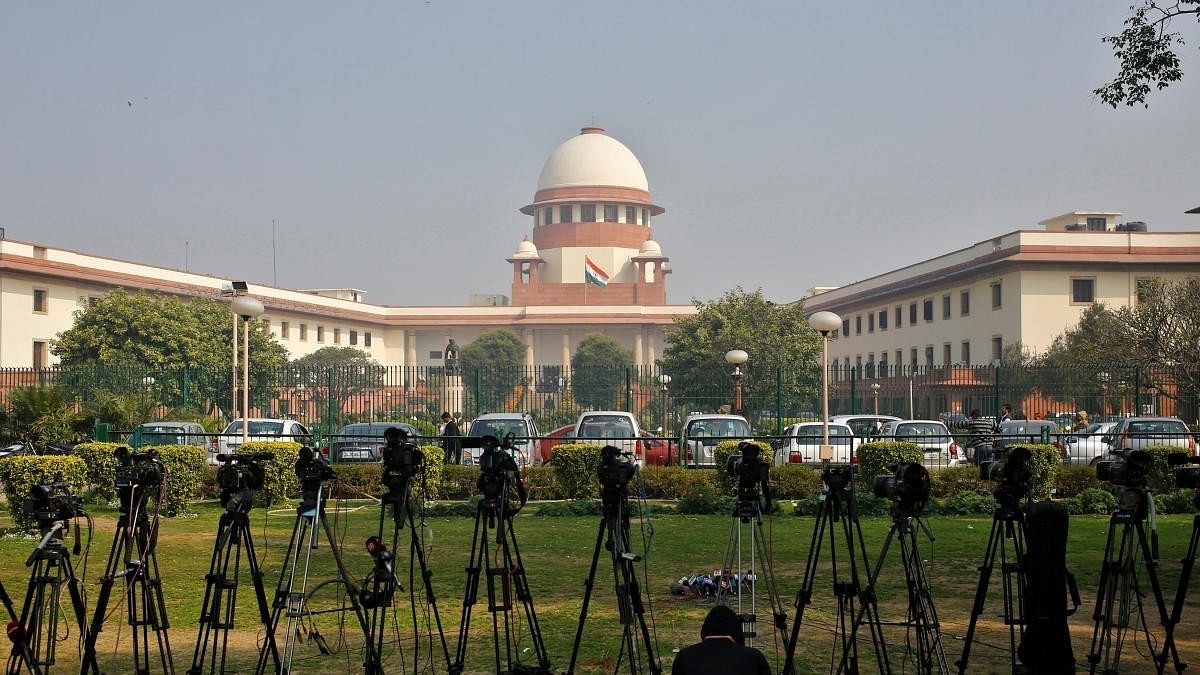
The Supreme Court of India.
Credit: Reuters File Photo
New Delhi: The Supreme Court on Monday asked the Centre to produce within three weeks the original records relating to its decision to block a 2023 two-part BBC documentary series on the 2002 Gujarat riots.
A bench of Justices Sanjiv Khanna and Sanjay Kumar directed the Centre to file its response on the pleas filed by veteran journalist N Ram, Trinamool Congress MP Mahua Moitra, activist lawyer Prashant Bhushan and lawyer M L Sharma challenging the government's decision.
The bench allowed the rejoinder affidavit to be filed by petitioners in two weeks thereafter and posted the matter for final hearing in January, 2025.
"This matter requires consideration. It cannot be disposed of in 10 minutes," the bench said, asking the Centre to comply with its February 2023 direction for producing the original records of the decision.
Solicitor General Tushar Mehta said the government hadn't filed a response and required another two weeks for the same.
Senior advocate C U Singh, appearing for the petitioners objected to Mehta's plea and said the government was aware that it had to file a reply but hadn't done it still.
Singh submitted it was an executive decision and the court could proceed even without the Centre filing its reply.
Justice Khanna, however, said the court needs to see the Centre's response in the matter.
On February 3, 2023, the top court had directed the Central government to produce the original records relating to its decision and issued a notice on the batch of pleas.
Singh then submitted the government had invoked emergency powers under the Information Technology (Intermediary Guidelines and Digital Media Ethics Code) Rules 2021 to block the documentary.
One of the petitioners alleged the ban on the documentary titled "India: The Modi question" was "malafide, arbitrary and unconstitutional".
Ram and others, in their pleas, have sought a direction to restrain the government from curbing their right to "receive and disseminate information" on the documentary.
"All citizens, including the press, have the fundamental right to view, form an informed opinion, critique, report on, and lawfully circulate the contents of the documentary as the right to freedom of speech and expression incorporates the right to receive and disseminate information...," the plea stated while referring to several top court decisions on freedom of speech and expression.
The plea has also sought quashing of "all orders directly or indirectly censoring" the information, including those shared on social media.
"Issue a writ of mandamus or any other appropriate writ, order, or direction to the respondents restraining them from giving effect to orders curtailing freedom of speech and expression without first putting them in the public domain on a centralised database," sought the plea.
The petitioners made Twitter Communications India Private Ltd and Google LLC as parties while seeking a direction to restore of their social media posts.
"The power of the executive under Section 69 A to lay down directions for blocking public access is limited to sovereignty and integrity of India, defence of India, security of the state, friendly relations with foreign states or public order or for preventing incitement to the commission of any cognisable offence relating to above," they said.
The contents of the BBC documentary were protected under Article 19(1)(a) (freedom of speech and expression) of the Constitution and the contents of the series did not fall under any of the restrictions specified in Article 19(2), added the petitioners.
"On January 17, 2023, BBC released the first of the two-part documentary series...which critically appraises the role of Prime Minister Narendra Modi, who was the then chief minister of Gujarat in 2002 when riots broke out in which thousands of people lost their lives," the plea said.
The plea, therefore, challenges the ban imposed by the secretary of the Information and Broadcasting Ministry.
Directions were issued under Rule 16 of the IT rules to Twitter India to block 50 tweets with links to YouTube videos of the BBC documentary.
Consequently, Bhushan's tweet and the link to the URL shared by Moitra were removed.
"The secretary, information and broadcasting ministry issued the impugned directions in his capacity as authorised officer under Rule 13(2) of the IT Rules 2021. The directions are prima facie illegal as they are in direct contravention of the interim order... passed by the Bombay High Court ...," the plea said.
The first episode of the documentary aired on January 17, it said, adding that the second part aired on January 24.
On January 21, 2023, the government had issued directions for blocking multiple YouTube videos and Twitter posts sharing links to the contentious documentary.